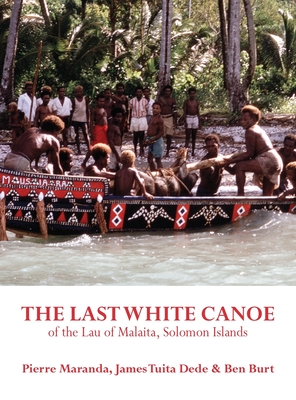The Last White Canoe of the Lau of Malaita, Solomon Islands

The Last White Canoe of the Lau of Malaita, Solomon Islands
Building a beautiful ornamented 'white canoe' was a way for the Lau people of Malaita in Solomon Islands to honour the ghosts of their ancestors in the days before they became Christians. This book tells the story of the last of these canoes, built in 1968 by one of the few clans still following their traditional religion, as witnessed by the late anthropologist Pierre Maranda. Maranda observed how the great artistic projects of Malaita were once supported by elaborate ritual procedures and celebrated with community festivals, all richly illustrated here by his photographs. James Tuita was among the Lau boys who played with Maranda's son and, years later, he visited Quebec to help Maranda with his research. Besides writing the Lau text for this book, he contributes his own acutely felt insights into the radical changes in Lau society during his lifetime and the importance of maintaining its cultural traditions. Ben Burt, a curator at the British Museum, knew Maranda through his own anthropological research in Malaita and worked with James Tuita to ensure that Maranda's plans for his ethnographic research were realized after his death. It is published, as Maranda intended, in Lau and English languages, to return some of their cultural heritage to the people of Lau, Malaita and Solomon Islands.This invaluable bilingual ethnographic account records with care and respect the social and religious life of a Pacific Islands community. The Last White-Canoe describes a people struggling against the challenges of colonial and Christian modernity through the revitalization of the craftsmanship and sacred knowledge of canoe-making during the transition from traditional religion to Christianity. With their experience of working with local experts and appreciation of indigenous historical and cultural knowledge, the authors confidently take the reader into the sacred world of this Lau community and the cultural heritage of Malaita and Solomon Islands. It is a task well done. Revd Dr Ben Wate, Solomon Islands National University
This bilingual, international collaboration in scholarship offers rich insights into the complexities of making a major cultural object in Solomon Islands in the mid-twentieth century. This is not just a matter of the technical and practical manufacture, but of the day by day sourcing of resources, provisioning of food and shelter for the makers, the negotiations among men and with other beings, the ritual procedures and offerings, the ea
PRP: 1157.33 Lei
Acesta este Pretul Recomandat de Producator. Pretul de vanzare al produsului este afisat mai jos.
1041.60Lei
1041.60Lei
1157.33 LeiIndisponibil
Descrierea produsului
Building a beautiful ornamented 'white canoe' was a way for the Lau people of Malaita in Solomon Islands to honour the ghosts of their ancestors in the days before they became Christians. This book tells the story of the last of these canoes, built in 1968 by one of the few clans still following their traditional religion, as witnessed by the late anthropologist Pierre Maranda. Maranda observed how the great artistic projects of Malaita were once supported by elaborate ritual procedures and celebrated with community festivals, all richly illustrated here by his photographs. James Tuita was among the Lau boys who played with Maranda's son and, years later, he visited Quebec to help Maranda with his research. Besides writing the Lau text for this book, he contributes his own acutely felt insights into the radical changes in Lau society during his lifetime and the importance of maintaining its cultural traditions. Ben Burt, a curator at the British Museum, knew Maranda through his own anthropological research in Malaita and worked with James Tuita to ensure that Maranda's plans for his ethnographic research were realized after his death. It is published, as Maranda intended, in Lau and English languages, to return some of their cultural heritage to the people of Lau, Malaita and Solomon Islands.This invaluable bilingual ethnographic account records with care and respect the social and religious life of a Pacific Islands community. The Last White-Canoe describes a people struggling against the challenges of colonial and Christian modernity through the revitalization of the craftsmanship and sacred knowledge of canoe-making during the transition from traditional religion to Christianity. With their experience of working with local experts and appreciation of indigenous historical and cultural knowledge, the authors confidently take the reader into the sacred world of this Lau community and the cultural heritage of Malaita and Solomon Islands. It is a task well done. Revd Dr Ben Wate, Solomon Islands National University
This bilingual, international collaboration in scholarship offers rich insights into the complexities of making a major cultural object in Solomon Islands in the mid-twentieth century. This is not just a matter of the technical and practical manufacture, but of the day by day sourcing of resources, provisioning of food and shelter for the makers, the negotiations among men and with other beings, the ritual procedures and offerings, the ea
Detaliile produsului








